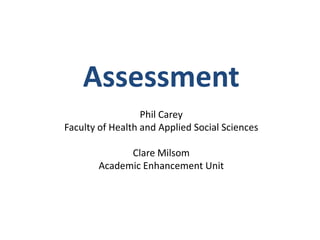
Pg cert lthe assessment 2012 bb
- 1. Assessment Phil Carey Faculty of Health and Applied Social Sciences Clare Milsom Academic Enhancement Unit
- 2. What is assessment for? • Reflecting knowledge • Demonstrating skills • Personal development • Rite of passage • Differentiating between students • Maintaining standards
- 3. Theoretical/philosophical basis of assessment? function perspective Reflecting knowledge Functionalism Demonstrating skills Instrumentalism Personal development Humanism Rite of passage Social learning Differentiating between Cultural capital students Maintaining standards Neo-liberalism
- 4. Assessment as a system • External factors – Professional/disciplinary expectations – Culture • Institutional factors – Resources – Regulations • Course-based factors – Team culture – Curriculum design – Procedures • Module factors – Module design
- 5. What do tutors bring? • Values/beliefs about assessment • Personal experiences – as assessor and as student • Awareness of good practice and methods • Time …to set the task…to mark…to feedback
- 6. What do students bring? • Cultural background and personal circumstances • Perceptions…of task and of tutor • Prior experiences • Approach to study • Time …to understand the task…to complete the task…to engage with feedback
- 7. What do ‘institutions’ bring? • Community of practice • Policy and regulation • Quality assurance and enhancement processes • Guidance and support • Staff development • Reward and recognition • Resources – personnel, time, technology
- 8. Types of assessment http://www.qaa.ac.uk/Publications/InformationAndGuidance/Documents/understanding- assessment-second-edition.pdf • Diagnostic • Formative • Summative DON’T FORGET….feedback
- 9. Why is assessment so important? 1. Assessment has a major influence on: what students learn how we teach how students organise their studies how individuals are able to progress 2. Staff and students spend more time on assessment than on anything else “Assessment IS the curriculum as far as many students are concerned – they’ll learn what they think they’ll be assessed on, not what’s in the curriculum or what’s been covered in class” Ramsden (1992)
- 10. Teaching teaching and understanding understanding 19-minute award-winning short-film about teaching at University: ((( http://www.daimi.au.dk/~brabrand/short-film/ ))) Students take responsibility for their learning. ‘Deep’ rather than ‘surface approach’
- 11. Course content Assessment Teaching methods Study approach Assessment
- 12. Constructive alignment (Biggs 1999) Learner constructs their own learning through learning activities Teaching and Assessment learning methods activities Intended Designed to learning Designed to meet outcomes assess learning learning outcomes outcomes How will they learn? What do we want our How will we know the students to know? students have learnt? ‘High levels of detail of learning outcomes and assessment criteria, allow students to identify what they ought to pay attention to, but also what they can safely ignore’. (Gibbs 2010: 25)
- 13. Structure of the Observed Learning Outcomes (Biggs and Collis 1982) SOLO taxonomy Surface understanding Deep understanding
- 15. Level Bloom Solo Verb [knowledge] [learning] 6/7 Creating Extended Design, hypothesise, construct, reflect 6/7 abstract Evaluating 5/6 Analysing Relational Apply, compare, analyse, debate 5/6 Applying 3/4 Understanding Multistructural Classify, illustrate, report, 3/4 Remembering Unistructural Identify, name, define, label, write All learning outcomes include: Verb, content, context
- 16. What’s wrong here? 1. Identify the key constitutional structures of the European Union and critically analyse the origins and effects of these structures by using the conceptual tools of comparative politics. 2. Recall the fundamental principles of structural, mechanical and electrical engineering. 3. Write a report on the decontamination of reclaimed land. 4. Explore global provision of emergency healthcare 5. State the six categories of Bloom’s taxonomy.